Loudoun Ophthalmology Services
Change your pointe of view..
SERVICES
Loudoun Ophthalmology
Cataract Surgery
Low Vision Needs
Retinal Disease Care
Diabetic Eye Disease Care
Full-service Laser Center
Glaucoma Evaluations and Treatment
Macular Degeneration Treatment
Injuries Or Eye Trauma
Glasses and Contact Lenses to Fit Any Style Or Budget
Cataract Surgery
Loudoun Ophthalmology wants you to truly understand what a cataract is and the treatments that are available to you and your family. Having all of the facts and tools at your disposal will ensure that you are more comfortable with your situation and how Loudoun Ophthalmology can make this decision even easier for you! First, let’s talk about what a cataract is. A cataract is a clouding of the lens in the eye that affects vision. Most cataracts are related to aging. Cataracts are very common in older people. By age 80, more than half of all Americans either have a cataract or have had cataract surgery. A cataract can occur in either or both eyes but cannot spread from eye to the other.
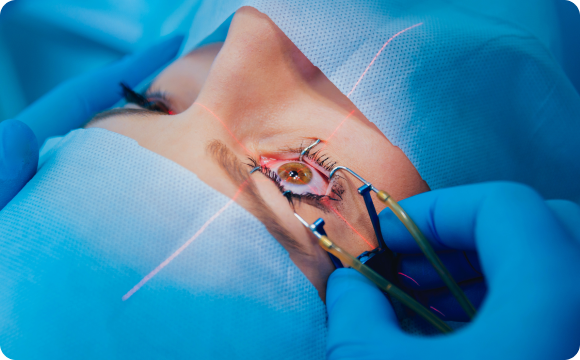
Most cataracts are related to the aging population and there are different types of cataracts:
Secondary Cataract
Cataracts can form after surgery for other eye problems,
Traumatic Cataract
Cataracts can develop after an eye injury, sometimes years later.
Congenital Cataract
Some babies are born with cataracts or develop them in childhood.
Radiation Cataract
Cataracts can develop after exposure to some types of radiation.
Now, let’s cover the surgical procedures offered here at Loudoun Ophthalmology. Keep in mind that all surgeries pose some risks, but with cataracts surgery, these are rare. There are two types of cataract surgery and we’ll explain them in more detail to you and which one will benefit you:
Phaco-Emulsification, Or Phaco
A small incision is made on the side of the cornea, the clear, dome-shaped surface that covers the front of the eye. Your doctor inserts
Extra-Capsular Surgery
Your doctor makes a longer incision on the side of the cornea and removes the cloudy core of the lens in one piece. The rest of the lens is removed by suction.
After the natural lens has been removed, it is replaced by an artificial lens, called an intraocular lens (IOL). An IOL is a clear, plastic lens that requires no care and becomes a permanent part of your eye. Light is focused clearly by the IOL onto the retina, improving your vision. You will not feel or see the new lens.
Some people cannot have an IOL. They may have another eye disease or have problems during surgery. For these patients, a soft contact lens, or glasses that provide high magnification, may be suggested.
At Loudoun Ophthalmology, we strive to professionally care for and treat each person as individuals and will ensure you are comfortable with your decision for cataract surgery and are kept in the best possible care!
Glaucoma Evaluation and Treatment
Loudoun Ophthalmology offers glaucoma evaluations and treatment whether we catch it early or later in the disease process. We want you to fully understand glaucoma and the steps we’ll take in order to maintain your vision.
Let’s take a look at what glaucoma actually is and possible treatments of it.
Glaucoma is a group of diseases that can damage the eye’s optic nerve and result in vision loss and blindness. It is one of the main causes of blindness in the United States. However, with early treatment, you can often protect your eyes against serious vision loss. Therefore it is very important that it be diagnosed.
Help protect your vision and the vision of your relatives and friends. African Americans over age 40, people over 60 years of age, especially those of Mexican descent, and people with relatives that have had the illness can run a high risk of having glaucoma.
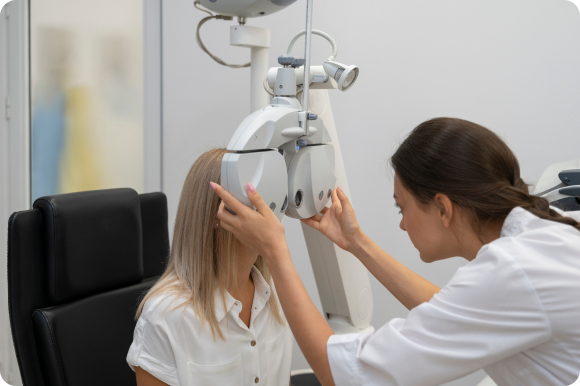
Loudoun Ophthalmology will evaluate and treat most cases of glaucoma ensuring that your eye disease can and will be controlled. We offer this through these various treatments:
Medications
These may be either in the form of eye drops or pills. Some drugs are designed to reduce pressure by slowing the flow of fluid into the eye. Others help to improve fluid drainage. For most people with glaucoma, regular use of medications will control the increased fluid pressure. But these drugs may stop
Laser surgery
During laser surgery, a strong beam of light is focused on the part of the anterior chamber where the fluid leaves the eye. This surgery results in a series of small changes that make it easier for fluid to exit the eye. Over time, the effect of laser surgery may wear off. Patients who have this form of surgery may need to keep taking glaucoma drugs.
Surgery
Surgery can also help fluid escape from the eye and thereby reduce the pressure. However, surgery is usually reserved for patients whose pressure cannot be controlled with eye drops, pills, or laser surgery.
Loudoun Ophthalmology strives to professionally care for and treat each person as an individual ensuring you are comfortable with your decision regarding your glaucoma while receiving the best possible care!
Low Vision
Loudoun Ophthalmology wants you to understand what low vision is and the treatments that are available to you or your family member. Having all the facts and tools at your disposal will help you be more comfortable with your situation and how Loudoun Ophthalmology can help you plan for your treatment.
First of all, low vision means that even with regular glasses, contact lenses, medicine, or surgery, you find everyday tasks difficult to do. Reading the mail, shopping, cooking, watching TV and writing can seem challenging. But, many people with low vision are taking charge by making better use of their remaining vision. Many individuals can continue to enjoy doing important daily activities that are so important to them and their family members!
You’re most likely wondering what you can do to correct low vision and the costs attached with it, right? Loudoun Ophthalmology caters to your needs and budget. While costs vary by region, typically, a low vision evaluation costs between $100 and $200; and remember, Medicare will cover low vision exams performed by eye care professionals and that private health insurance usually does not. We have state of the art techniques and some of the area’s most talented professionals ensuring that this debilitating disease does not take you out of the game.
Loudoun Ophthalmology strives to professionally care for and treat each person as an individual ensuring you are comfortable with your decision regarding your low vision while receiving the best possible care!
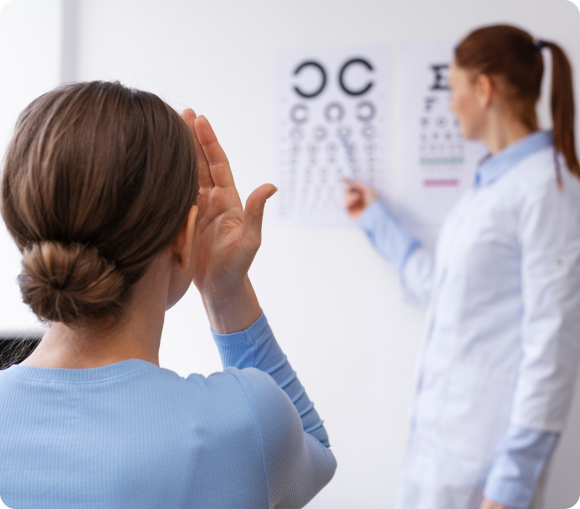
Diabetic Eye Disease
Loudoun Ophthalmology understands that the detection of diabetic eye disease is important and offers one of the area’s most prestigious and state of the art facilities in order to assist you or your family member cutting edge technology. We want you to fully understand what you may be facing and the professional steps that we’ll take in order to care for your vision.
In order to properly understand diabetic eye disorders, we need to fully explain what they are and how to treat them.
Diabetic eye disease has no warning signs. Finding and treating the disease early, before it causes vision loss or blindness, is the best way to control diabetic eye disease. If you have diabetes, make sure you get a dilated eye examination at least once a year.
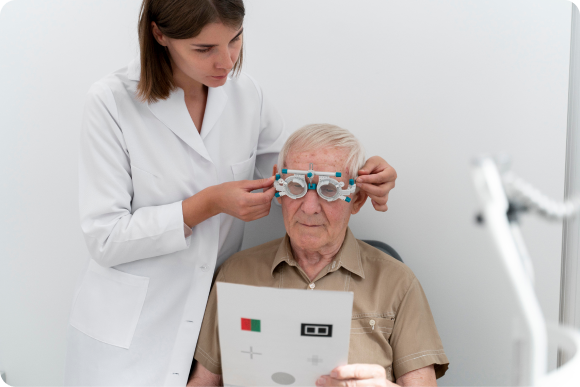
Diabetic eye disease includes:
Diabetic retinopathy
Damage to the blood vessels in the retina.
Cataract
Clouding of the lens of the eye.
Glaucoma
Increase in fluid pressure inside the eye that leads to optic nerve damage and loss of vision.
The question asked of Loudoun Ophthalmology the most regarding diabetic eye disease is, “can diabetic retinopathy be treated?” The short answer is, “yes” and at Loudoun, we’re more than happy to show you how!
As your eye care professionals, we may suggest laser surgery in which a strong light beam is aimed onto the retina.
Many of our patients ask us if they can do to prevent diabetic eye disease and the answers as follows: Diabetes is a disease that can cause very serious health problems. If you have diabetes:
- Know your ABCs: A1C (blood glucose), blood pressure (BP), and cholesterol numbers.
- Take your medicines as prescribed by your doctor.
- Monitor your blood sugar daily.
- Reach and stay at a healthy weight.
- Get regular physical activity.
- Quit smoking.
Loudoun Ophthalmology strives to professionally care for and treat each person as an individual ensuring you are comfortable with your decision regarding your diabetic eye disease while receiving the best possible care!
Injuries or Trauma to the Eye
Injuries or blunt trauma occur daily to eyes more frequently than you’d think. When trauma or injury happens, the patient is in pain and Loudoun Ophthalmology is here to assist the patient and help remedy the situation.
Some common injuries or afflictions of the cornea are:
- Allergies
- Conjunctivitis (pink eye)
- Corneal infections (dry eye)
- Fuchs’ Dystrophy
- Herpes Zoster (shingles)
- Iridorcorneal endothelial syndrome
- Keratoconus
- Lattice dystrophy
- Ocular herpes
- Ptergium
- Stevens-Johnson syndrome
Loudoun Ophthalmology strives to professionally care for and treat each person as an individual ensuring you are comfortable with your decision regarding your trauma or injury to the eye while receiving the best possible care!
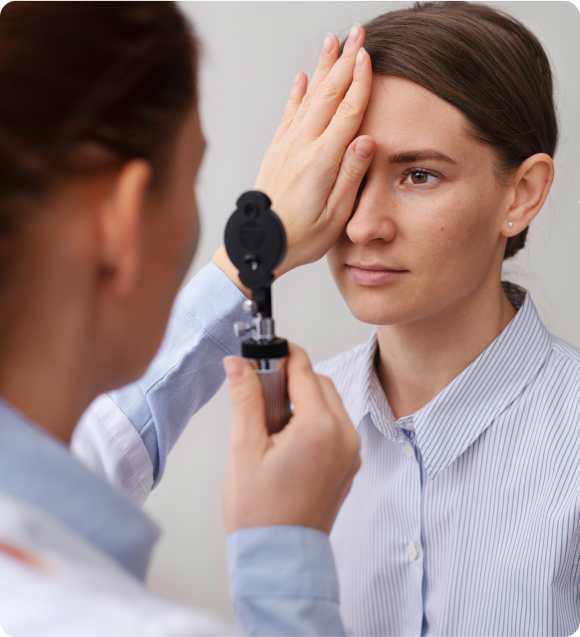
Macular Degeneration
Loudoun Ophthalmology offers treatment for macular degeneration no matter what stage we identify it. We want you to fully understand this condition and the professional steps that we’ll take in order to care for your vision.
As with other eye disorders, macular degeneration (AMD) is painless, yet it is a disease that blurs the sharp, central vision you need for “straight-ahead” activities such as reading, sewing, and driving. AMD affects the macula, the part of the eye that allows you to see fine detail.
In some cases, AMD advances so slowly that people notice little change in their vision. In others, the disease progresses faster and may lead to a loss of vision in both eyes. AMD is a leading cause of vision loss in Americans 60 years of age and older.
AMD occurs in two forms: wet and dry.
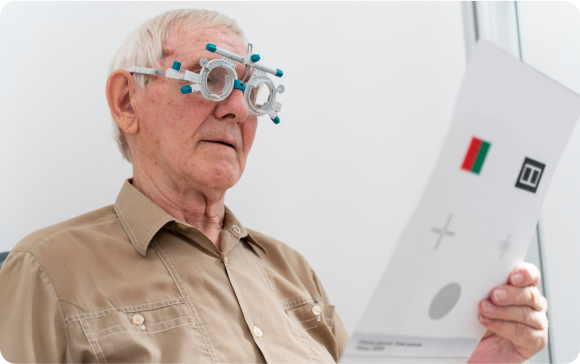
Retinal Diseases
Loudoun Ophthalmology wants you to understand what retinal diseases are As well as the treatments that are available to you or your family member. Having all the facts and tools at your disposal ensures that you will be more comfortable with your disease and its possible treatments.
Retinal diseases vary widely. Some are common and easily remedied, while others are rare, more difficult to diagnose and require more complex or, sometimes, urgent treatment. The team at Loudoun Ophthalmology is skilled in differentiating these diseases, and then designing a treatment plan that slows or stops the disease and preserves as much vision as possible.
Our team’s approach to care and its professional eye specialists work together with other specialists to provide comprehensive care by treating your eye condition and any other disorders at the same time. For example, ophthalmologists can consult with diabetes care specialists regarding patients with diabetic retinopathy.
More of the common treatments we offer include:
- Retinal detachment
- Diabetic retinopathy
- Epi-retinal membrane (macular pucker)
- Retinal tear
- Macular hole
- Age-related macular degeneration
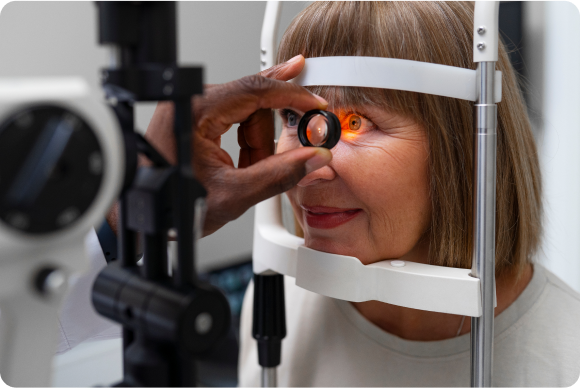
Loudoun Ophthalmology strives to professionally care for and treat each person as an individual ensuring you are comfortable with your decision regarding your retinal diseases while receiving the best possible care!